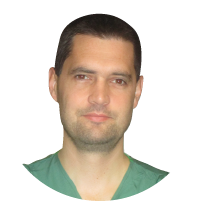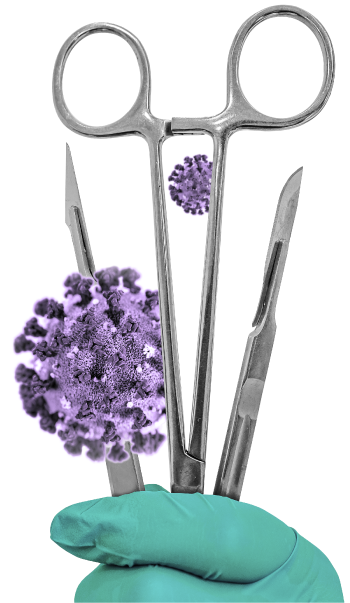As healthcare professionals, we strive to be better and do our best every day, to protect our patients, in their most critical moments.
While experience is our teacher, Continuous Education (CE) is an inseparable part of performing well and doing an outstanding job in patient safety.
ASP University is your best teacher when it comes to CE in the field of patient safety, infection prevention, and sterilization of medical devices with low-temperature sterilization methods.
It is a community of healthcare professionals who share the same drive – to improve safety and excel at Medical Device (MD) reprocessing.

I have always believed that the best resource available to tackle the challenges within decontamination is a well informed and knowledgeable staff. The training resources available on ASP University provide an engaging space in which I can further develop the skills of my team which ultimately provides a better end product for our services users

“It was a pleasure to collaborate with ASP on a webinar regarding Circular Economy in the Healthcare sector. The organisationwas very professional and I hope ASP will continue to incorporate sustainability in medical education.”

“ASP university has created a multiprofessional platform where leading experts can share their knowledge and innovative ideas. Being part of this team is an honour, giving me the opportunity to contribute with my own insights while learning from others.”

“Covid held us bound to our hospitals and took away the possibility to meet and enlarge our knowledge by attending congresses and scientific meetings. On the other side online meetings, working and sharing information came into the picture. ASP University was able to set up a portal to bring together important information about reprocessing of medical devices and infection prevention. By providing scientific documents and organizing webinars with experts from the field they support us healthcare professionals in improving our daily practice.”

“Continual professional development plays an important role in an ever changing and demanding health sector. ASP University provide us with the best solutions, case studies and resources available which assist and support teaching and eLearning resources to all our healthcare professionals. This results in highly skilled staff, high staff retention and most importantly improves on our patient safety and quality improvements.”

“There is no substitute for education. ASP university is an excellent resource for all decontamination Managers in order to empower their staff with best knowledge to produce quality products and to understand the science behind their profession.”

“As a healthcare professional, I consider continuous training to be fundamental. Having a website available with updated information according to the state of the art is excellent. The site is visually pleasing, and the information provided is extremely important for our daily practice.”

“Team effort is paramount to achieve best results specially for health workers. ASP academy helps bringing professionals together and sharing knowledge to reach the highest goals.”

We live in unprecedented times of rapid technological and societal changes including massive advancement in healthcare. Decontamination of medical devices has developed from craft to full-fledged science. Education now plays huge role in ensuring safest patient care possible. As an educator I am delighted to see ASP making commendable effort in delivering free high quality content to healthcare professional across the world.
ASP University is a resource I am happy to recommend to my students and to anyone who wants to learn more about the best practice in decontamination and use of medical devices.

“I visited ASP University website. I found it very complete and enriching. The website is usable and responds to usability criteria so as surfing through is very easy and the icons are expressive and clear. What I found interesting is the bibliography link and eBooks. The website structure is also very intuitive and easily comprehensible. I am very proud to collaborate with ASP University for the opportunities it offers me to update my knowledge in the field of medical devices and be able to hear the opinions of very important experts and stakeholders. The organizational steps are carefully followed, and the expert is never let alone but assisted and guided along. The preparation of webinars is very encouraging and stimulates the authors to be competitive and precise. I feel that ASP combined scientifical expertise and technical excellence and offers an educational product of high quality and professionalism.”

“ASP University is a modern, simple and focused training and information platform on current issues in sterilization. Being accessible at the distance of a click, it allows its use in any context and from any device with a built-in internet browser. His future will be even more captivating, considering the modules under development.”

It was great to be part of the ASP University webinars. I learned a lot from the other panel members, who are experts in their fields, about how we can reduce the carbon footprint of healthcare.

It has been a great pleasure to discover ASP university and to collaborate with a higly professional team. ASP University’s platform is so well-documented and organizes webinars with experts. This allows us to remain updated, improve our practice and ensure safe and secure care for patients across the world.
Looking forward to more webinars and publications.

I am an infection prevention and control nurse, and despite several years of experience in this area, I need to continuously develop at theoretical and practical level, and ASP has been a great support.

I appreciated this opportunity to raise awareness for the crucial role of circular and sustainable design in the medical device industry. I hope that our discussions will inspire more device manufacturers and hospitals to improve their sustainbility, to treat the other eight billion patients on the planet who are outside the hospital walls.

Live and On-demand, all live webinars are recorded and registrants receive a replay link.

Distinguished Healthcare
practitioners,
professionals/professors and
decontamination experts that
partner with ASP

Factsheets with key messages;
Certificate of attendance;
CRCST Certification Program.
High quality CE knowledge
and skillset for assured
professional growth
- Infection Preventions and Control
- Central Services Sterilization Department (CSSD)
- Biomedicine – Biomedical Engineers / Specialists
- Surgeons and Nurses at the Operating Room
- Health Technology Assessment


You will get lifelong access to CE webinars,
delivered by top notch healthcare professionals
on topics about sterilization of OT instruments
and the issues related to it.
ASP Webinars provide as well a deep dive
into specific challenges such as:
- Endoscope reprocessing
- Laparoscopic and robotic surgical instruments,
- Other challenges in the decontamination process – in the field of bronchoscopy urology, ophthalmology, arthroscopy, and more fields that need proper instrument processing
We also cover the subjects of:
- Health technology assessment
- Infection Prevention Best practices
- Rules of the Spaulding Classification for instrument safety
- Circular economy in view of the latest series of webinars addressing the “Challenges of Medical Devices Reprocessing”
- Upcoming series of live webinars addressing the importance of “Circular economy in Healthcare: a roadmap for new solutions”
- Safety of Care in the COVID-19 Pandemic and afterward
- Standards and guidelines for sterilization methods
- Quality and Safety Standards in infection control

I WANT MORE INFORMATION
EACH YEAR, ASP UNIVERSITY LAUNCHES
NEW SERIES OF WEBINARS, COVERING THE TOPICS ABOVE.
All webinars are free of charge and can be watched on demand at your own pace at a
time convenient for you.
Your additional TAKEAWAYS

A FREE
FACTSHEET WITH
KEY TAKE-HOME
MESSAGES AFTER
EACH WEBINAR

A PERSONAL
CERTIFICATE
OF ATTENDANCE
BY ASP UNIVERSITY

CRCST
CERTIFICATION
AND RESPECTIVELY
CE CREDITS
You can earn your CRCST certification by enrolling HSPA Section and on top you can obtain CE credits by enrolling in the E-Modules Section, which is being accredited by UK College of Personal Development.
you register at
ASP University today.
- You will not miss important announcements
about the next webinar, topics and speakers - You will be part of the conversation, day by day
- You can ask questions and learn from other
members of the ASP University community - You can share the lessons learned from your
experience in reprocessing of surgical instruments.
DO YOU NEED MORE REASONS TO REGISTER?
JOIN US AND BECOME A PART OF THE
COMMUNITY.
BECOME A PART OF THE COMMUNITY


Every day, millions of surgeries are done throughout the world. Surgical Site Infections (SSIs) can complicate any type of surgery and are among the most prevalent healthcare associated infections (HAI)1.
According to the ECDC, 18,3% of all HAIs in Europe are SSIs.2
However, the reprocessing of the devices used in these procedures is challenging and requires appropriate techniques.
According to the last ECRI report, device cleaning, disinfection, and sterilization are on the top 10 of Patient Safety Concerns.3

- Global guidelines for the prevention of surgical site infection, second edition. Geneva: World Health Organization; 2018. (pag.27 3.1 Surgical site infection risk factors: epidemiology and burden worldwide). https://www.who.int/gpsc/ssi-prevention-guidelines/en/
- Prevalence of healthcare-associated infections, estimated incidence and composite antimicrobial resistance index in acute care hospitals and long-term care facilities: results from two European point prevalence surveys, 2016 to 2017 (Pag. 7, Table 3) https://www.eurosurveillance.org/content/10.2807/1560-7917.ES.2018.23.46.1800516
- Special Report Top 10 Patient Safety 2020 – Executive-Brief, ECRI, page 9, 5. Device Cleaning, Disinfection, and Sterilization. https://www.ecri.org/landing-top-10-patient-safety-concerns-2020
